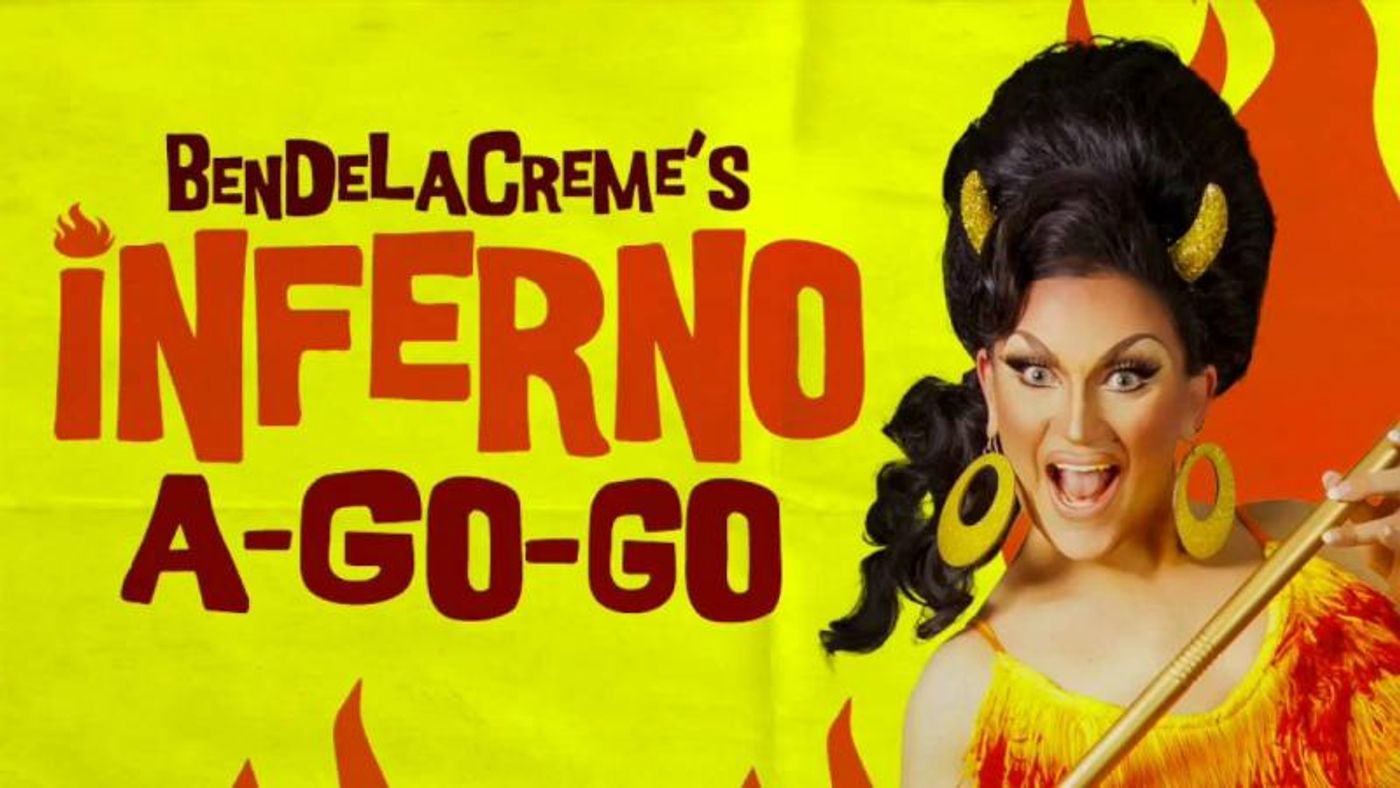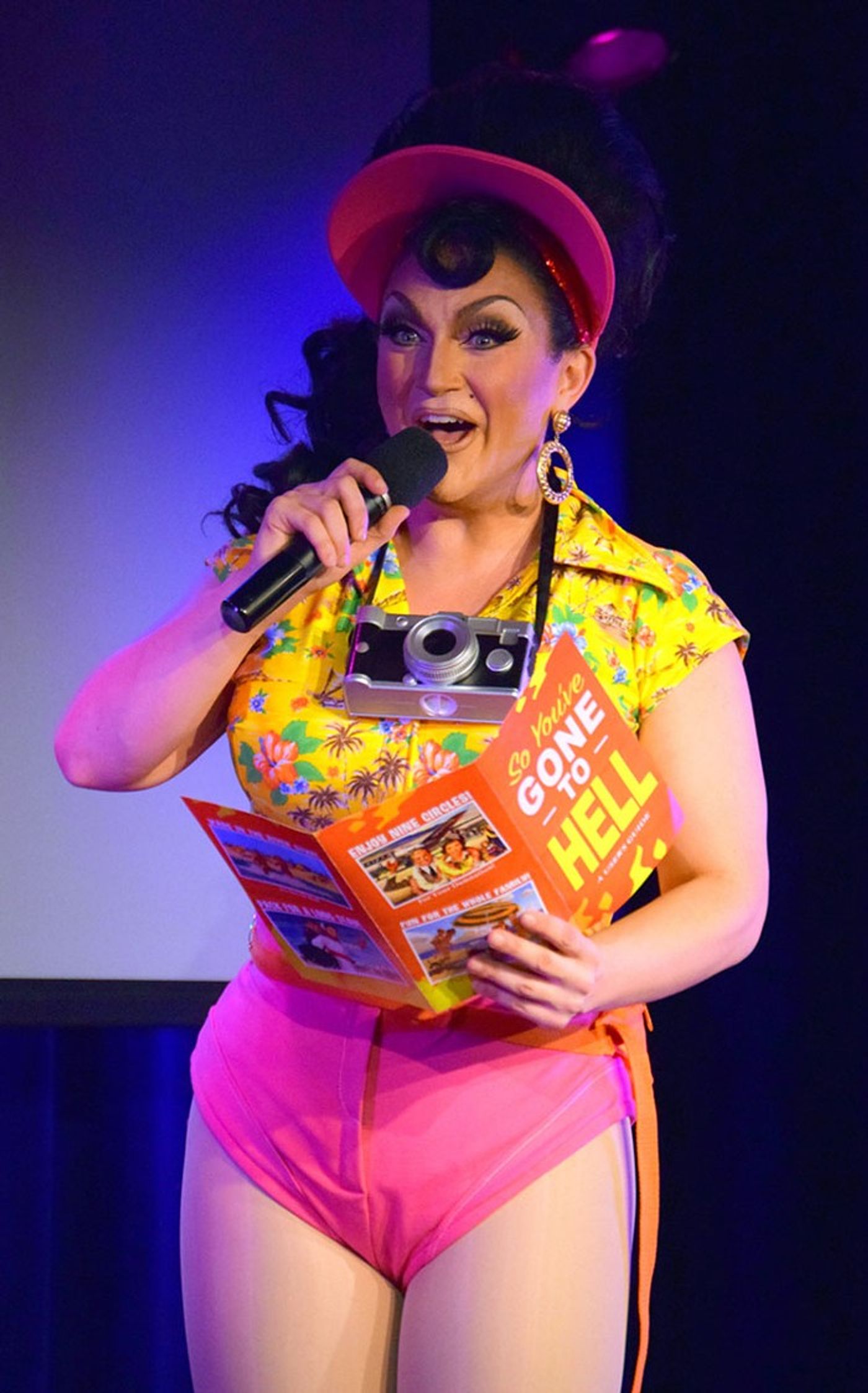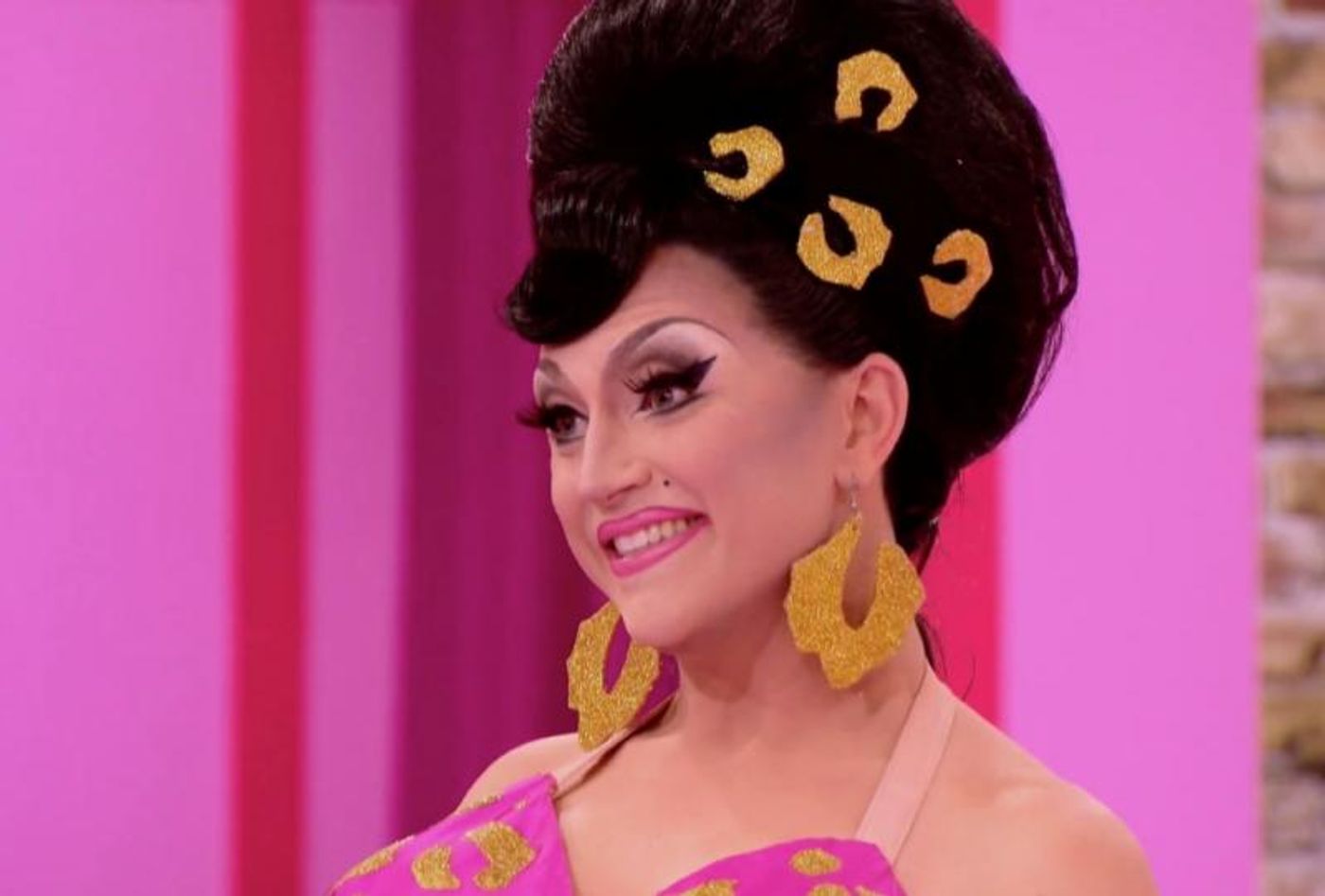Interview: DRAG RACE's BenDeLaCreme Talks INFERNO A GO-GO, Life After ALL STARS 3 and Making Art Accessible

Photo courtesy of the artist.
BenDeLaCreme may have been dubbed "BenDeLaChrist" by Aja on RUPAUL'S DRAG RACE ALL STARS 3, but for her next act, the queen is headed straight to Hell.
DeLa's latest show, INFERNO A GO-GO, was inspired by Dante's Inferno and written before ALL STARS 3 was "even a glimmer" in the star's eye. The show is set to return to New York for the second series of performances.
Before kicking off the new run, DeLa spoke with us by phone about the show, rethinking life after that shocking self-elimination, and being a role model for your younger self.
This interview has been edited for content and length.
TF: What can you tell me about INFERNO A GO-GO?
B: This is my second run at the Laurie Beechman in New York, and I've been touring it around. It's the third solo show that I have written. I'm very excited and proud of it. It's based on Dante's Inferno and follows it very closely, more closely maybe than one would expect from a drag performance. The premise is that BenDeLaCreme is following in Dante's footsteps, descending into hell and going through all the circles, meeting a lot of the same characters that Dante describes in the book, sort of altered to my campy, joke-y cabaret sensibility.
So, it's a narrative, but it's in the form of cabaret variety, so as we go through each circle, we get to interact with puppets and do songs and have various sorts of comedic vignettes, but they all add up to this one tale of analyzing what it is to have a sense of morality on Earth and beyond. That's my favorite way to work when I'm doing my own shows is taking a lofty concept and figuring out how to make it fun and campy and comedic and give people the opportunity to just laugh and kick back and be at a show but also come away with maybe a little something else.
TF: Where did the concept come from?
B: It's sort of the way that I've made most of my work in my life, which is that the concept was one that I stumbled upon for one reason, and then as I was writing and developing the show, other reasons that I was maybe working with this material at this moment in my life revealed themselves to me. The initial thing was I was on a plane back from emceeing the burlesque show at the [World] Buskers Festival in New Zealand, and I had a due date because I had a show premiere set. I needed to make a poster and a title and a big show description because the opening night was set and we were overdue to get marketing done, so then I would have to write the show after that. And that's kind of how things always go for me.
So I was on the plane, and I had no concept for this show yet. And I was kind of racking my brain. My last show had been called COSMOS; SPACE. TIME. SPLASH OF CRAN., which was based on the Neil deGrasse Tyson COSMOS television series. So it was all about science, but, again, kind of taking that format and making it campy and ridiculous, and I did a striptease through all of evolution, where I stripped from like a fish to a dinosaur to an ape to a human.
So that's the kind of format that I'd been working in. I was like, okay, I like this structure of taking something existing that's a little bit lofty and figuring out how to make it into something sort of more lowbrow and accessible. I was thinking about what that might be and for some reason, Dante's INFERNO popped into my head and I was like, oh, this is perfect because it's divided up into these various segments, these nine circles, so it lends itself to doing something like a cabaret or a variety show where there are sections. Then I landed in the airport in New York, and I went to the bookshop, and there was one copy of Dante's Inferno just sitting on the shelf in an airport bookshop, which seemed totally insane. I took that as a sign.

Photo: Jason Russo
But then, as I was writing it, I really was realizing, "Oh, there's a lot of parallels in my life right now." I was actually having an argument with some very close friends that had been ongoing and I was thinking a lot about, okay, what does this mean when people...are reasonable and good and that you've been close with, and you don't see eye to eye at all? What does it mean to have this sense of right and wrong, which is not objective, and how do you know? That's a lot about what Dante's talking about in the book.
TF: Do you have a favorite moment from the show?
B: I have quite a few. I don't want to give away any of the end, but when the whole thing comes together... I guess I can say that there are a few favorite moments. I really enjoy getting to enter the Gates of Hell, and I've created all these small dioramas that I hand-make and do video footage of, then we project it as the background setting for coming through Hell. So, first, getting to bring people into this world while I'm seeing a Miley Cyrus parody about entering the Gates of Hell is really fun. Crossing the River Styx through audience interaction and the music of the band Styx, of course, is a lot of fun. I really think my favorite moment is at the end, where I get to draw together all the themes and generally really have this intimate moment with the audience, where we all kind of maybe have a little personal discovery or a little introspection around the real theme of Dante's INFERNO, which is, "How do we create our own hells around us?"
TF: I read that you've been doing drag for about 15 years. How did you get started getting into drag originally, and how did you move into this kind of work?
B: I can't really give a starting point of when I started drag. People get into drag in different ways, but I'm really one of those people who... It's an old trope, but drag chose me. When I was younger, like a little kid, I was wrapping bath towels around myself as a dress. I was just obsessed with these sort of female archetypes and kind of would pretend to portray them just to myself in my bedroom. There has always been this draw to this in me. And then it wasn't until I was older and able to discover this world of drag, it wasn't so much, "Oh, this is something I want to get into." It was more like, "There's a context for who I am."
So, I immediately knew this was my one and only destiny. I was living in Chicago at the time; I was going to school for visual art. As soon as I turned 21, I started entering amateur competitions. I got hired fairly quickly, doing weekly shows places. But I had this experience of... I was going to school and loving the thought process I was learning. I was loving this analysis of artmaking and how to kind of develop things conceptually. But there was this snootiness. You have to speak these certain formal languages in order to understand the artmaking. You'd go to a gallery, and I'd have to be in art school right now in order to process what this artist is trying to put out there. And I would have friends who weren't in school who would come with me and they'd be like, "I don't feel like I have access to this."
Then, meanwhile, I was doing all these nightclub shows, and it was a lot of sort of glamour and dick jokes and stuff like that. It all felt a little empty, but it felt necessary. I needed to be there, doing it. It was these sort of two conflicting worlds that, at some point, I realized could be married.
TF: I read an interview you did after ALL STARS 3, basically talking about how liberating it has been since you've been on the show again. I was wondering if you could expand on that, kind of throwing the rule book out the window and doing what works for you.
B: I think this is one of those things that a lot of my life---always, and certainly in recent years---has been pointing to, is kind of questioning... The very nature of being a drag queen, especially being a little kid who's drawn to drag, there's this way in which you're already starting out kind of at this deficit of you're not going to be able to incorporate yourself into the kind of societal rules that you're hearing. You know, even as a little queer kid, you're just like, "All right, well, I'm not going to grow up and get married and have a baby and whatever." Because, at the time I grew up, that really didn't seem like an option. So, if that basic structure isn't there, what kind of life am I gonna make up for myself? And that can feel really overwhelming but also kind of empowering. We kind of start there and then, I think, over the course of our lives, we continue to hear, "Okay, you need to play by this rule. Okay, you need to play by this rule."
But being on DRAG RACE, I really do feel like, in that moment where I left the show, it was a little bit of a personal epiphany. I'd been so conflicted about going on the show because I don't like the ALL STARS format. I don't think it's necessary to pit queens against each other in that way. I think the beauty of DRAG RACE to me is all about seeing people's skills, seeing this amazing artform that I love and getting to meet the personalities behind it. But I sort of felt like going on, "Okay, I want to do this. I want to be a part of this phenomenon again," but there was always a little bit of, "Ugh, I'm giving up a little of something to get the other."
When I was on set in that moment, I just realized, "Oh, I've had this amazing experience. I'm just in this perfect opportunity, where I don't have to do that other thing. There are no rules. There's no one in charge here..." It's a game, and it's sort of an illusion, and you decide that somebody else has power over you. In that moment, I really was like, "I don't need to value the same things that anyone else is valuing. I can create my own values. And I feel like here they are." Since then, I've really been able to incorporate that more and more into my own life.
That's another one of the interesting things I was saying earlier about [INFERNO A GO-GO]. I already had this show that's basically about these same themes, so getting to return to perform this show after having this experience on DRAG RACE, it's interesting. It sort of makes me look a little bit at how much did writing this show actually inform that kind of thinking for me and kind of allow me to start making these other decisions.
TF: Speaking about what you were saying about being a queer kid, in your Facebook post in March to fans about being kinder, you said that part of your reason for appearing on the show was the kid you once were "needed to see the adult" you are now." Did you have any queer idols growing up?
B: It was really rough. I did not. I grew up in a very small town in Connecticut, and we lived in this big old farmhouse in the middle of the woods. At that time, I didn't really have access to the internet. There were a few little glimmers of queerness out there; like, at some point, I knew that QUEER AS FOLK was a thing that existed, but we didn't get the station that I would be able to see that on. I knew there was an OUT magazine out there somewhere in the world, but even the little glimmers of that that I saw didn't feel like they applied to me. They were these very handsome, muscular kind of clean-cut guys. I was this chubby, weird little kid who just had a totally kind of bonkers personal aesthetic. None of it seemed like I would ever be in that world. It seems to me like the only queer world out there was not for me. Later, in retrospect, I realized there were some cultural nudge-winks to me. Certainly, I think that's why PEE-WEE'S PLAYHOUSE resonated with me a lot. It's very camp, and there's a huge queer sensibility to it, as well as Elvira, [who] was kind of a light in the dark. There were these things that later, looking back, I feel like, "Okay, somebody was winking at me out there. Somebody was saying, 'There is a world for you.'"
But I wish that could have gotten that message loud and strong. I really needed it. I was a really depressed, sad kid. That's really a ton of why I feel like DRAG RACE is so important and how prevalent drag and queer culture are right now. I just think about how different my life would have been and how differently I would've felt if I saw that there was a future for me. So, I like the idea that I now get to be the visible possible future for the kids in that same position.

Photo: VH1
TF: With ALL STARS 3 or DRAG RACE in general, do you feel any pressure when you're doing these shows, to reference that or include that experience in the cabaret work?
B: It's impossible to ignore. Certainly, a lot of the people who are coming in the door right now are people who are coming because they saw me on the show. I actually think it's sort of an interesting thing... I said no a couple of times to going [back] on the show, and that's for lots of reasons, but one of them was, I now have this audience coming in who knows me because they know my work. They've been seeing and hearing about what I make, and they're coming in for that reason. Going onto ALL STARS means [going] back to the basics of somebody's coming because they love RUPAUL'S DRAG RACE, and now I have to teach them what I do. Watching that is different from watching me impersonate Julie Andrews for 20 seconds.
So, I incorporate all of that into the opening monologue, to kind of be like, "Okay, let's clear the air. Let's acknowledge this thing. This is what's happened. This is why you know me. That's not why we're here, so let go of all that. We're moving forward."
TF: Besides this show, what else are you working on this year?
B: I'm continuing to work on my stuff here in Seattle. I'm re-mounting my Halloween play, which is this '60s horror movie kind of piece of satire, pastiche, and so we'll be remounting that in October, and I'm very excited about that... I'm also working on a new holiday project with one of my favorite performers that I've been working with since before both of our DRAG RACE stints, which is Jinkx Monsoon. We've been looking for the right two-person project for years and years, so we are now writing a holiday show that we'll be touring in December... I'll be out in Provincetown performing INFERNO all summer long, and Jinkx does her show out there, so we're actually sharing a house for like five weeks, and we'll just be buckling down and writing this Christmas show. So, it'll be a lot of fun.
BenDeLaCreme will be performing INFERNO A GO-GO to the Laurie Beechman Theatre from Thursday, May 24 through Sunday, June 3. For tickets and information, visit www.westbankcafe.com.
Troy Frisby is an entertainment writer and digital news producer based in New York. Follow him on Twitter @TroyFrisby.
Videos


